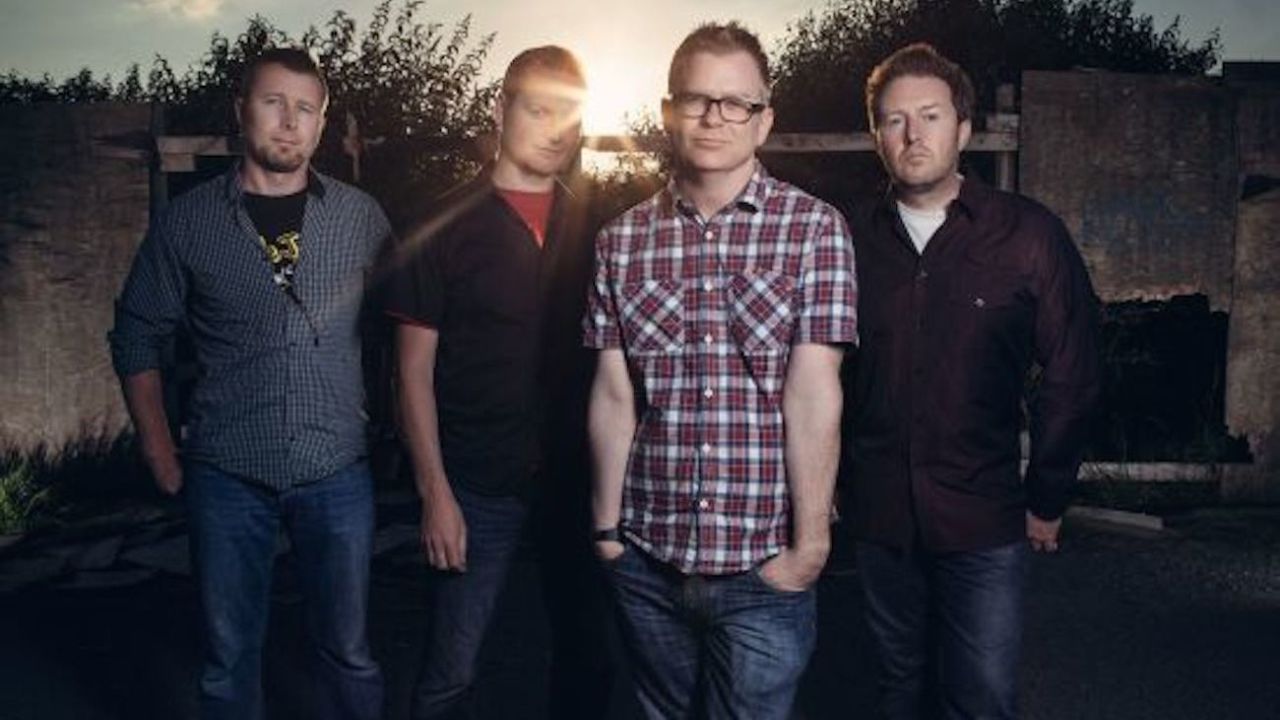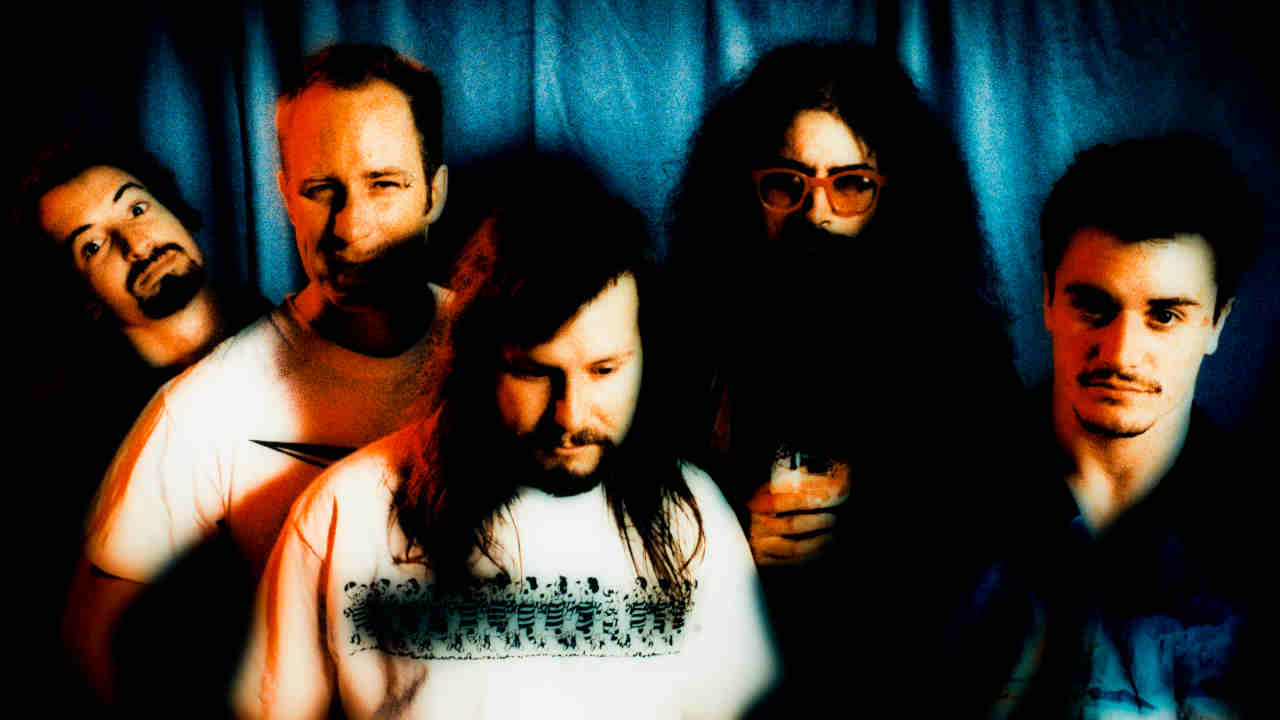Kerbdog: On The Return
The inside story of Kerbdog's death and resurrection show

Supercharged Irish four-piece Kerbdog are back with new single Electricity, a string of UK dates in November and a triumphant live album, Congregation. Frontman Cormac Battle brings us up to speed.
When Kilkenny’s Kerbdog released their second album On The Turn in the middle of the UK’s Britpop explosion they were unceremoniously dropped by Mercury Records.
In the mid-nineties the marketing money and king-making clout of the major labels turned from rock to Britpop, hip-hop and the Spice Girls, and Kerbdog were abandoned despite having signed a six-album deal. But since 1997 the band, and On The Turn in particular, have become celebrated influences. ‘Kerbdog are one of the most underrated bands ever,’ says Simon Neil of Biffy Clyro. ‘It’s a crime that Kerbdog are not held aloft by every band in the country as heroes.’
They may yet have that chance. Frontman Cormac Battle soldiered on with the band Wilt before becoming a major radio DJ in Ireland, but word of Kerbdog spread. On The Turn was released before sites like Napster, Kazaa and Limewire changed the way music reaches our ears. When ripping and downloading became standard practice, more and more people fell in love with the likes of Sally, Mexican Wave and JJ’s Song, the album’s three hit singles-that-never-were. Like grunge without the temper tantrums, Kerbdog offered something entirely more ennobling: a signpost towards the future at a time when most businesspeople were looking at only the most immediate commercial corners.
‘We were the right band with the right album at the wrong time,’ says Battle today. But in 2005 a chance text to drummer Darragh Butler and bassist Colin Fennelly resulted in sold-out reunion shows at the Temple Bar Music Centre in Dublin, kicking off a renaissance which led to live recordings being made 2012 shows in London, Bristol and Dublin. Original guitarist Billy Dalton properly rejoined the fold before the quartet’s Sonisphere performance in July and now, with the flicker becoming a flame, a fan-funded Pledge campaign is bringing the live album Congregation, which includes new studio single Electricity, Single Of The Week on TeamRock Radio’s breakfast show this week, to light.
If brilliant bands can fail for bad timing it seems only fair that sometimes – just sometimes – the stars align for a second time.
Team Rock: Congregation captures the vibe and excitement of Kerbdog’s return. How did the recordings come about and when did you realise you had something special on your hands?
Sign up below to get the latest from Metal Hammer, plus exclusive special offers, direct to your inbox!
Cormac Battle: Sort of by stealth. Our drummer Darragh and Dave Draper, who’s now great friends with the band, recorded the gigs with an eye to having a live document, not necessarily with any commercial aspiration. When they played them to the rest of us we were like ‘Jesus! I can’t believe we sound this good. This is quite a shock.’ It snowballed from that, and the live album became a reality.
The Pledge campaign to fund Congregation has had a great response, hitting the 100% mark this week. Did it feel like a leap of faith? Was there any trepidation in putting yourself out there again?
Loads of trepidation. I was saying to Darragh, look, you knock yourself out. I was very surprised by the amount of support. Without doing some kind of YouGov research, we had no idea who the fuck would care. It could have gone to 2% and that would have been the end of it. But it seems to be rolling along nicely, which is very encouraging. It’s all a bit odd to be honest.
In 1996 a band like Bush could go triple-platinum in the USA, but in 1997, what were the label’s expectations for On The Turn? Why were they disappointed?
The Britpop explosion had happened, and it was all about Oasis and Blur and Pulp and all those other peripheral bands in the UK. Our label had to make choices. We’d spent half a million quid making On The Turn. We were meant to spend six weeks in LA and ended up there for four months. They were going to commit to it in a major way, or say ‘Fuck it, let’s cut our losses’. In April 1997 the album limped into the shops and they dropped us within about sixteen seconds.
Songs like Dry Riser, Sally and Mexican Wave are big favourites and have become celebrated influences in their own right. Which songs are you fondest of playing live today?
The ones with the big fucking dirty riffs, because I don’t have to sing at the same time. On The Turn, and Pledge. I love playing Sally, for the big singalong. It’s really good fun and it’s sort of a vindication. In 1997 we’d play to 40 people, but now we can play to 800 or 900. So with those songs I can stand back, let people sing along, and just drink it in because it really was something special. We knew it in our hearts.
Before that, which bands were influencing and feeding into Kerbdog?
Quite a hodgepodge. Things like Loop, Spacemen 3 and Sonic Youth – but when Metallica’s ‘Black Album’ came out we couldn’t ignore the power of it. It seemed to completely consume us. On our first album there was a lot of trying to replicate the ‘Black Album’, crossing it with bands like Hüsker Dü and Fugazi. A strange marriage, but that’s what we were trying to do.
Was there anything new in play by the time you recorded On The Turn?
Completely. If we were to have our time back, the first album would have been our demo and On The Turn would have been our debut. By then, we had found who we were. I had come along massively as a songwriter; it wasn’t all about chuggy-chuggy riffs. I believed in songs. REM are a huge influence, because what they do is song-craft. I tried to do that with Kerbdog, but with nuclear-powered amps.
Perhaps it’s different for bands nowadays, but in your experience what were the biggest dangers in signing a major-label contract?
We signed when we were very young and very naïve, and we weren’t really making any decisions for ourselves. We didn’t trust ourselves. The mistake we made was that we didn’t take it seriously enough. We thought it would just happen: we’d sell ten million albums. But it wasn’t like that. We should have been rehearsing ten hours a day and writing 100 songs for an album instead of saying ‘We’ve got ten songs so let’s record them: that’s an album.’ We were actually quite a fucking lazy band. That’s one of the things I certainly regret. We didn’t have anyone kicking our ass or ringing us at nine o’clock in the morning saying ‘Get the fuck into the rehearsal studio and start writing songs!’
What kind of pressures contributed to Billy leaving? You sound quite critical of yourself, as if Kerbdog were totally unprepared.
When we went to LA the producer Garth Richardson was used to working with experienced top-of-the-range musicians like Rage Against the Machine. So when we arrived he exposed us for being, in some respects, a ‘punk’ band who didn’t rehearse and didn’t really give a shit. Once we had a tune we thought we’d be fine. But he really ground us down, big time. Eventually Billy said ‘I don’t really think this is for me anymore.’ He left as soon as we got back to Ireland. We were all pretty bruised by the experience. We weren’t expecting anyone to expect such high standards from us. Nevertheless it was an exponential learning curve. We had to pull ourselves together and stop fucking about.
In the aftermath, did it feel as if you had lost your job?
In a strange way, yes. It was very disappointing because I thought On The Turn was a brilliant album. I thought we’d been extremely hard done by, just through circumstances. Within a couple of months I went down to the dole office in Kilkenny and signed on, because I didn’t have a job. But you know what, the writing was on the wall. We could feel the lack of commitment and the winds of change. It was all about Britpop. Maybe if our management had been stronger or more forceful things could have been different. Nevertheless they weren’t, and we were dropped, and that was the end of it. As soon as that happened I started Wilt, because I wasn’t ready to hang up my boots.
Simon Neil from Biffy Clyro, Matt Davies from Funeral for a Friend and Dave McPherson from InMe speak of Kerbdog in the highest terms. As a DJ playing records, have you been able to hear Kerbdog’s influence on contemporary acts?
In terms of the riffology, you can certainly hear our influence going through. Biffy Clyro are very vocal about us being a huge influence on their sound and that they used the same producer as a result. In some ways I feel through them a kind of vicarious success. They’re such lovely guys and they’re a brilliant band. I’m very flattered they’d mention us as a touchstone in what they do.
In the run-up to the November dates what’s the feeling – excitement, or perhaps even a sense of unfinished business?
Excitement, yes, though we haven’t done nine dates in a row in a very long time. We’ll treat it like a holiday and have a lot of fun. It’s also a chance to say thank-you. A lot of people wouldn’t have had the chance to see us. We’d long broken up before they could have heard us live. A lot of what happened with us was people saying ‘Heard this? Have that,’ and burning CDs. I don’t give a fuck how people get our music, so we seem to have this new younger audience who weren’t there before. Had they been there in the first place things might have been different, but it’s nice to go out because you meet loads of people who say ‘I was only 12 when this album came out – and I absolutely love it.’
To pre-order Kerbdog’s Congregation album, and access a range of bonus material from the band, click here.
Kerbdog play the UK and Ireland next month. See the quartet at:
Nov 14 Dublin, The Academy
Nov 15 Manchester, The Ritz
Nov 16 London, The Forum
Nov 17 Bristol, Bierkeller
Nov 18 Plymouth, The Hub
Nov 19 Southampton, Talking Heads
Nov 20 Birmingham, The Oobleck
Nov 21 Nottingham, Rock City Basement
Nov 22 Glasgow, Ivory Blacks (Sold out)
